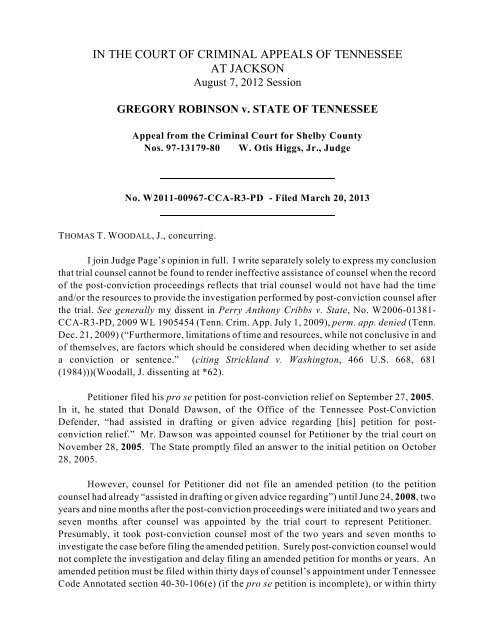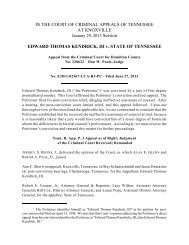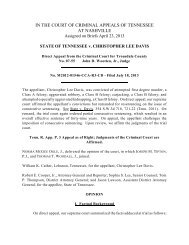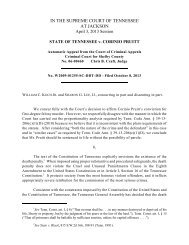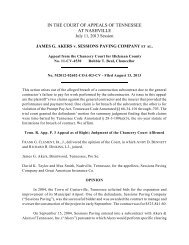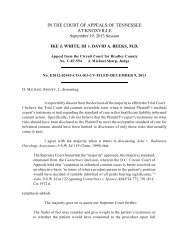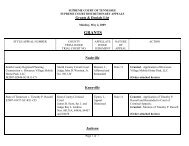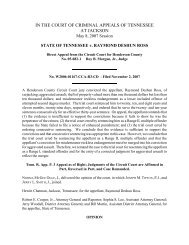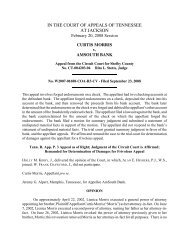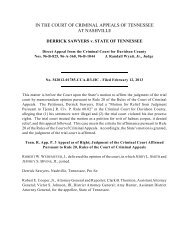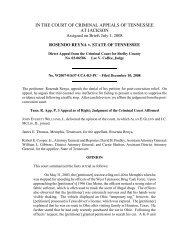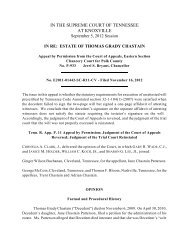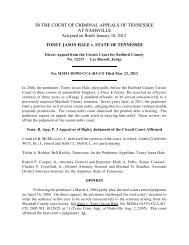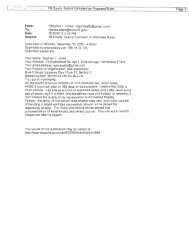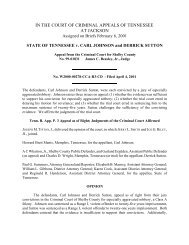Gregory Robinson v. State of Tennessee - Tennessee Administrative ...
Gregory Robinson v. State of Tennessee - Tennessee Administrative ...
Gregory Robinson v. State of Tennessee - Tennessee Administrative ...
You also want an ePaper? Increase the reach of your titles
YUMPU automatically turns print PDFs into web optimized ePapers that Google loves.
IN THE COURT OF CRIMINAL APPEALS OF TENNESSEE<br />
AT JACKSON<br />
August 7, 2012 Session<br />
GREGORY ROBINSON v. STATE OF TENNESSEE<br />
Appeal from the Criminal Court for Shelby County<br />
Nos. 97-13179-80 W. Otis Higgs, Jr., Judge<br />
No. W2011-00967-CCA-R3-PD - Filed March 20, 2013<br />
THOMAS T. WOODALL, J., concurring.<br />
I join Judge Page’s opinion in full. I write separately solely to express my conclusion<br />
that trial counsel cannot be found to render ineffective assistance <strong>of</strong> counsel when the record<br />
<strong>of</strong> the post-conviction proceedings reflects that trial counsel would not have had the time<br />
and/or the resources to provide the investigation performed by post-conviction counsel after<br />
the trial. See generally my dissent in Perry Anthony Cribbs v. <strong>State</strong>, No. W2006-01381-<br />
CCA-R3-PD, 2009 WL 1905454 (Tenn. Crim. App. July 1, 2009), perm. app. denied (Tenn.<br />
Dec. 21, 2009) (“Furthermore, limitations <strong>of</strong> time and resources, while not conclusive in and<br />
<strong>of</strong> themselves, are factors which should be considered when deciding whether to set aside<br />
a conviction or sentence.” (citing Strickland v. Washington, 466 U.S. 668, 681<br />
(1984)))(Woodall, J. dissenting at *62).<br />
Petitioner filed his pro se petition for post-conviction relief on September 27, 2005.<br />
In it, he stated that Donald Dawson, <strong>of</strong> the Office <strong>of</strong> the <strong>Tennessee</strong> Post-Conviction<br />
Defender, “had assisted in drafting or given advice regarding [his] petition for postconviction<br />
relief.” Mr. Dawson was appointed counsel for Petitioner by the trial court on<br />
November 28, 2005. The <strong>State</strong> promptly filed an answer to the initial petition on October<br />
28, 2005.<br />
However, counsel for Petitioner did not file an amended petition (to the petition<br />
counsel had already “assisted in drafting or given advice regarding”) until June 24, 2008, two<br />
years and nine months after the post-conviction proceedings were initiated and two years and<br />
seven months after counsel was appointed by the trial court to represent Petitioner.<br />
Presumably, it took post-conviction counsel most <strong>of</strong> the two years and seven months to<br />
investigate the case before filing the amended petition. Surely post-conviction counsel would<br />
not complete the investigation and delay filing an amended petition for months or years. An<br />
amended petition must be filed within thirty days <strong>of</strong> counsel’s appointment under <strong>Tennessee</strong><br />
Code Annotated section 40-30-106(e) (if the pro se petition is incomplete), or within thirty
days <strong>of</strong> the entry <strong>of</strong> the “preliminary order” pursuant to <strong>Tennessee</strong> Code Annotated section<br />
40-30-107(b)(2), unless the time limit is extended for good cause.<br />
Also, the record shows that Dr. Auble did not perform her evaluation <strong>of</strong> Petitioner<br />
until July, 2008, two years and ten months after the post-conviction proceedings were begun,<br />
and two years and eight months after counsel was appointed. Dr. Dudley, <strong>of</strong> New York City,<br />
did not perform his evaluation <strong>of</strong> Petitioner until July, 2009, three years and eight months<br />
after post-conviction counsel was appointed to represent Petitioner.<br />
Lead counsel and co-counsel cannot be faulted, or deemed to have rendered deficient<br />
performance, for failure to uncover information expressed by Drs. Auble and Dudley when<br />
it took almost three years and four years, respectfully, for post-conviction counsel to have<br />
Petitioner evaluated by these experts. It is inconceivable that a trial in a capital case would<br />
be delayed for three to four years after indictment for defense counsel to obtain the<br />
evaluations <strong>of</strong> Dr. Auble and Dr. Dudley.<br />
Likewise, it is unreasonable to conclude that, in order to perform as competent<br />
counsel and render effective assistance <strong>of</strong> counsel, trial counsel in a capital case or any other<br />
case, must have between two and three years after becoming counsel <strong>of</strong> record to perform<br />
the basic investigation <strong>of</strong> a defendant’s case. I reach this conclusion based upon the premise<br />
that the gathering <strong>of</strong> information for the filing <strong>of</strong> the detailed and lengthy Amended Petition<br />
(over 120 pages) by post-conviction counsel took most <strong>of</strong> the time consumed between<br />
appointment as counsel and filing <strong>of</strong> the Amended Petition (two years and seven months).<br />
The record <strong>of</strong> the trial proceedings shows that Petitioner was indicted on December 16, 1997,<br />
and his trial began eleven months later on November 16, 1998. Based upon the record in the<br />
post-conviction proceedings, it appears that neither lead counsel and co-counsel nor any other<br />
counsel would have been able, due to time constraints, to perform all <strong>of</strong> the tasks and<br />
preparation Petitioner alleges they should have done. In my dissent in Cribbs, I stated,<br />
There is not a “do over” ground for granting post-conviction relief. That is<br />
to say, the law does not require post-conviction relief to be granted simply<br />
because if a petitioner can have a second chance, a more voluminous record<br />
for mitigating pro<strong>of</strong> can be submitted for a sentencing hearing.<br />
Cribbs, 2009 WL 1905454, at *62.<br />
I wish to reaffirm my position expressed in Cribbs and clarify that it also applies to<br />
pro<strong>of</strong> in the guilt phase <strong>of</strong> a trial.<br />
-2-<br />
___________________________________<br />
THOMAS T. WOODALL, JUDGE


